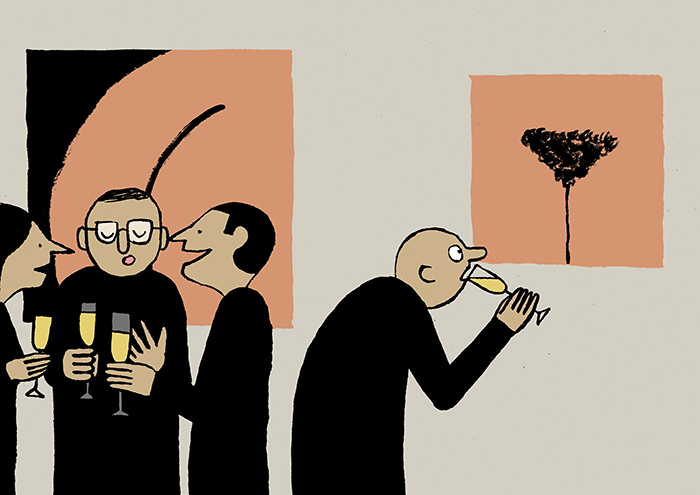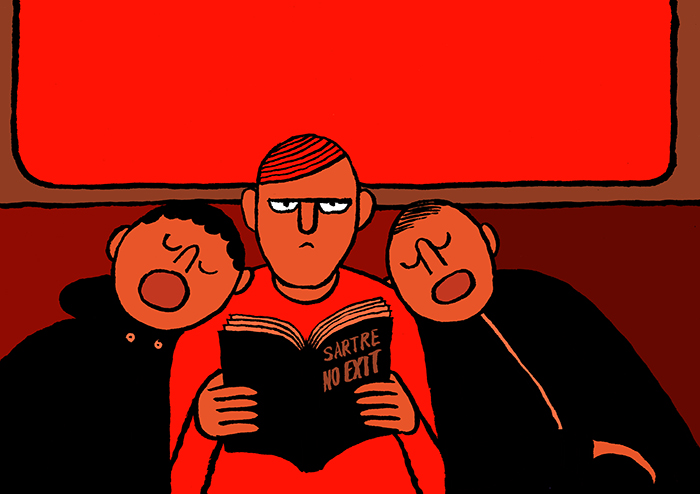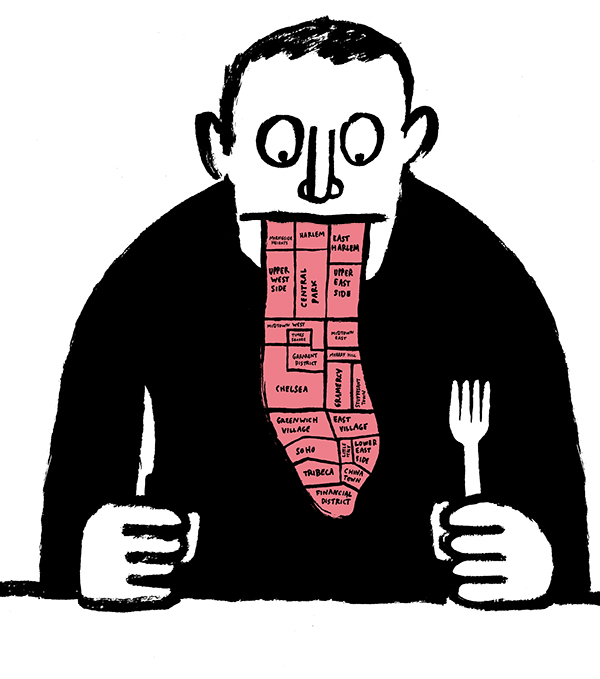ON CENSORSHIP: JEAN JULLIEN
When tragedy strikes, words can be incapable of expressing our grief. We turn to images instead as the very best ones capture simply and succinctly what we are all feeling. The most powerful among them not only pay homage, they become rallying cries. WNW Member #5414 Jean Jullien's "Je Suis Charlie" is that image for the recent terrorist attack in France. We sat down with him recently to discuss the fine line between criticism and censorship, the ways social media impacts creativity, and how he designs both chocolate and chairs. (Plus, his upcoming show in Los Angeles!)
You immediately responded to this event with the very creative expression that was targeted. Was there a moment of hesitation or was this what drove your prompt response?
No, there wasn't a moment of hesitation on whether to react or not: it was a heartfelt reaction, very instinctive. I needed to respond. I was touched as French kid growing up reading Cabu, as an illustrator and as citizen of the free world (however corny that might sound.) I was shocked by the atrocity and tried to show my solidarity in the way that I know best: with a drawing.
A tragedy like this raises discussions regarding censorship and freedom of expression. Have you ever felt the need to self-censor? In what scenarios would that be appropriate?
Oh yeah, I do it all the time. All creatives do I think. But I wouldn't necessarily call that censorship, it's more about being critical and assessing your work before putting it out there. I often think of people's reactions before uploading an image on social media. I don't want to upset people for the sake of it, because I realize that one image can be interpreted in the wrong way, or because it might not always be appropriate to "jump on the bandwagon" —so to speak.
Major media outlets, including the New York Times, decided against reposting Charlie Hebdo cartoons in their coverage of this event. Executive Editor Dean Baquet stated, “We have a standard that is long held and that serves us well: that there is a line between gratuitous insult and satire. Most of these are gratuitous insult.” Do you agree with that distinction?
I do agree with that distinction, but I don't agree with them saying that Charlie Hebdo was gratuitous insult. That's misunderstanding the work of these cartoonists, which is surprising for an institution such as the New York Times. Charlie was not subtle in their humour, I agree, but their heart was in the right place. They weren't insulting the prophet, they were making fun of people who are using violence in his name. They wanted to depict him as a character, to articulate their point. There was humour in that, not hatred.
I can completely understand that people got upset by the depiction of the prophet, I really can. But in a modern peaceful world, you react by suing them, or making a cartoon in response to voice your anger. You don't respond with murder.
It's important to understand that it's not about cartoons and cartoonists, it is about the bigger picture: it's about culture vs obscurantism. If we let terrorists dictate what can and cannot be printed, then next is music, papers, cinema...Culture as a whole!
Yes, content can be offensive and one has the right to be offended. It just should be responded to in a civilized manner.
The reaction from artists like yourself is inspiring. What are other artists’ reactions (to this tragedy and others) that you admire and why?
David Pope, Lucille Clerc and Ruben Oppenheimer did fantastic pieces on the subject. I liked Mr. Pope's for his depiction of the absurdity of the duel. In his cartoon however, it seems as if the murderer defends himself, as if he'd realize the disproportion of his act. Unfortunately, that's not the case in real life. Lucille's was full of hope and strength, which we all need now. I think the biggest "lesson" to arise from this tragedy was that people are ready to stand up for their freedom of speech.
5. Where are you excited to head next? What are you excited to make?
I'm currently working on my first solo show in Los Angeles, which opens on March 27th at HVW8 Gallery. It's called POOR TRAITS and will be a series of portraits. It's quite a change from what I've been doing in my shows so far but that's what shows are for in my opinion. I'm really excited to get there and meet a new audience.
I also have a food show in Paris where I'm working with chocolate makers to create a giant chocolate sculpture (as well as a "capsule" series of chocolate), burger makers for a special event, and designing a giant table unit to host the whole thing. I'm partnering up with French food magazine Fricote, for whom I designed this cover:
I love working with these guys and I'm excited to try "designing" food!
I'm also working with an actor that I love on his next book and with Opening Ceremony. I've also been working with my brother Nico on an animated series pilot that we're eager to present to networks and hopefully get produced! It uses a very cartoony visual language to discuss quite current matters such as our food obsessions, religion, popular culture, feminism, body shaving, etc...
6. Some of the social observations you make are about our love affair for screens. Do you think that influences budding creatives' practice? If so, how?
I think it's helping creatives define audiences and what makes them tick. We store and check in online so much, we map ourselves so openly that it's heaven for anyone trying to create targeted content. The audience defines itself and, in a way, helps design the content they are eager to "discover". It's an interesting take on supply and demand...
I think about it constantly, trying to intellectualize it in my work but I'm also a prime "victim" of it, constantly checking my phone and social media. I'm as addicted as any of us. That's why I allow myself to be a bit cynical and critical in the images I create: I'm laughing at myself too.
One of the things that drives my work is Communication. I do what I do to create discussion and to exchange with people. Social media has allowed that to happen in a fantastic way. It is now very easy to put something out there for people to see and react to. It's of course also very easy for people (trolls...) to get involved and ruin it for everyone. C'est la vie!
So yeah, I enjoy drawing our modern life because I find it fascinating and because I'm so concerned by it. It's a form of social documentation, trying to discuss things as they happen.
7. IS THERE GOING TO BE A CHAIR SERIES?!
I hope so, there has been a table! There are so many things that I want to do like furniture, clothing, movies etc... I just need to find the right partners and opportunities to make it happen!
A bit of Jean's work:
























